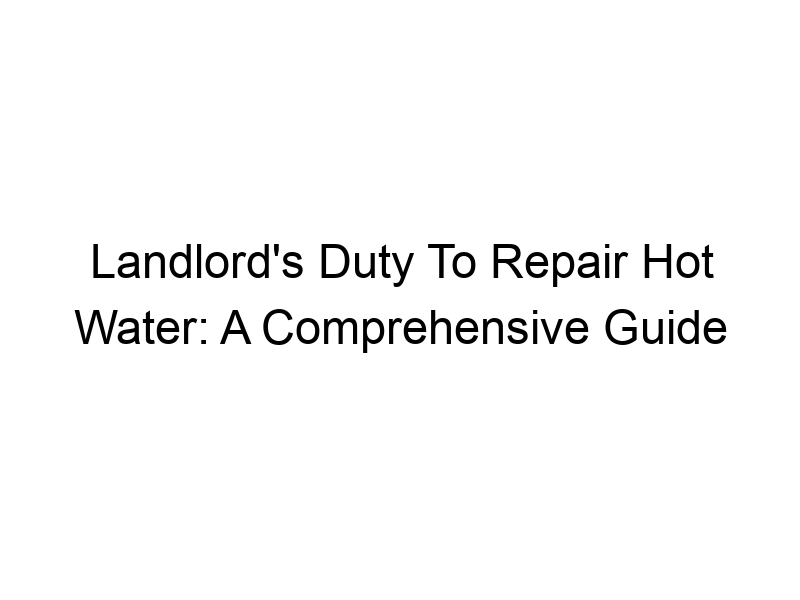Stepping into a chilly shower after a long day can be incredibly frustrating. But what happens when your hot water isn’t working and it’s your landlord’s responsibility to fix it? Understanding your rights and the legal timeframe involved is crucial. This guide will comprehensively answer the question: how long does a landlord have to fix hot water, exploring state laws, tenant responsibilities, and the process of resolving this common issue. You’ll learn how to navigate this situation effectively, protecting your rights and ensuring your comfort.
Most jurisdictions have an implied warranty of habitability, meaning landlords must provide a dwelling that’s fit for human habitation. This includes essential services like hot water. The exact definition of “fit” can vary by state, but hot water is almost universally considered essential.
Failure to provide it can be grounds for legal action.
State and Local Laws Vary
The specific timeframe a landlord has to fix hot water differs greatly depending on your location. Some states have specific laws outlining response times, while others rely on common law principles. Consulting your local housing authority or a tenant rights organization is vital to understand your rights in your specific area. For example, New York might have a faster response time mandated by law compared to Texas. Always check your lease agreement as well; it might contain clauses related to repair timelines.
How Long is “Reasonable”?
Defining Reasonableness
When state law doesn’t specify a timeframe, courts often determine a “reasonable” time for repair. Factors influencing this include: the severity of the problem (a complete lack of hot water is more serious than a minor temperature fluctuation), the availability of repair services, and the landlord’s efforts to address the issue. What is deemed “reasonable” in a rural area with limited plumbing contractors might differ from a bustling city with readily available services.
The Importance of Documentation
Thorough documentation is key in any dispute with a landlord. Keep records of all communication, including emails, texts, and letters. Note the date and time of every contact, and maintain copies of repair requests submitted. If a contractor is involved, retain copies of their quotes and invoices. This detailed record can be essential should you need to pursue legal action.
Steps to Take When Your Hot Water is Not Working
1. Notify Your Landlord Immediately
Prompt notification is crucial. Use a method that allows for verifiable proof of communication, such as registered mail, email with a read receipt, or certified mail. Keep a copy of the notification for your records. It’s good practice to record the date, time, and the method of your communication in a detailed log.
2. Follow Up on Your Request
If you haven’t heard back within a reasonable timeframe (this will depend on your local laws and the complexity of the repair), send a follow-up communication. Be polite but firm in reiterating your request.
3. Document the Lack of Hot Water
If the landlord fails to respond adequately, gather evidence demonstrating the lack of hot water. This could include photos, videos, and even witness statements from neighbors or family members who have experienced the same issue.
Legal Recourse for Unreasonable Delays
Withholding Rent (Proceed with Caution)
In some jurisdictions, tenants can withhold a portion of their rent while the landlord fails to make necessary repairs. However, this should be done cautiously and only according to your state’s specific laws. Improperly withholding rent can lead to eviction. It’s crucial to thoroughly research your state’s regulations and understand any potential legal consequences before taking this step.
Filing a Complaint
Many states have tenant rights organizations or housing authorities that can help resolve disputes between landlords and tenants. Contacting these organizations can provide guidance, mediation, and possibly legal action support. They can help you understand your rights and how to proceed legally.
Preventing Future Hot Water Issues
Regular Maintenance
While the landlord is responsible for major repairs, tenants should take proactive steps to prevent minor problems. Regularly checking for leaks, avoiding excessive hot water usage, and reporting any unusual noises can help minimize potential issues.
Understanding Your Lease Agreement
Thoroughly read your lease agreement. It may contain specific clauses relating to repairs and responsibilities. Understanding these clauses can prevent disputes and clarify expectations.
The Landlord’s Perspective: Repair Costs and Timelines
Factors Affecting Repair Time
Landlords face various factors impacting repair time, including contractor availability, parts supply chain issues, and budgetary constraints. Communicating openly and understanding these constraints can help avoid misunderstandings. A landlord might require time to secure a qualified plumber and necessary parts, especially for less common issues.
Liability and Insurance
Landlords often carry insurance policies covering property damage and liability. However, these policies don’t always cover every situation, and insurance claims can sometimes take time to process.
Dealing with Complex Repair Situations
Major Plumbing Issues
If the hot water issue stems from a major plumbing problem requiring significant repairs or replacement of the water heater, the process may take longer. Patience is key, and consistent communication with the landlord is essential.
Multiple Tenant Buildings
In larger buildings with multiple units, resolving hot water issues can be more complex due to the impact on numerous tenants. The landlord might need to coordinate repairs across several units, leading to a longer overall process.
Understanding Your Rights as a Tenant
Tenant Rights and Responsibilities
Remember that tenants have rights and responsibilities. It is your responsibility to notify the landlord promptly of any problems, as per the terms of your lease. Landlords, in turn, have a legal obligation to provide a habitable dwelling, and failure to repair essential services like hot water within a reasonable timeframe can be legally challenged.
Tenant and Landlord Communication: The Key to Resolution
Effective Communication Strategies
Open, clear communication is crucial. Maintain a calm and respectful demeanor, even when frustrated. Clearly outline the problem, the timeframe, and the desired outcome. Regularly checking in with the landlord about the progress of the repairs can significantly improve the process.
Different Types of Hot Water Systems and Their Repair Times
Tankless Water Heaters
Tankless water heaters, while often more energy efficient, may require specialized repairs, which might increase repair time. Their internal components may be less accessible than those in traditional tank heaters.
Traditional Tank Water Heaters
Traditional tank water heaters are generally easier and faster to repair. Common issues like thermostat malfunctions or anode rod replacements often have quicker turnaround times than more complex problems in tankless systems.
Frequently Asked Questions
What happens if my landlord refuses to fix the hot water?
If your landlord refuses to repair the hot water after you’ve given them proper notice, you should consult with a tenant rights organization or an attorney in your area. Depending on your location and the specifics of the situation, you may have legal recourse, such as withholding rent (following specific legal guidelines), pursuing legal action, or filing a complaint with a housing authority. Remember to meticulously document all communication and attempts to resolve the issue.
How much rent can I legally withhold?
The amount of rent you can legally withhold varies significantly depending on your state’s laws. Some states allow you to withhold only a portion of your rent that is proportional to the value of the lack of hot water, while others have stricter rules. You should always consult local regulations or a legal professional before withholding any portion of rent.
Can I do repairs myself and deduct it from rent?
In most jurisdictions, it’s advisable to avoid performing repairs yourself and deducting the cost from the rent unless you have explicit written permission from your landlord. Unauthorized repairs might create more problems and complicate matters, potentially leading to disputes. It’s generally best to communicate with your landlord and let them handle the repairs.
What if the hot water issue is a result of my own negligence?
If the hot water issue is a direct consequence of your own actions or negligence (for example, intentionally damaging the water heater), your landlord is likely not obligated to fix it and you may be responsible for the repairs.
Can I break my lease if hot water is not fixed?
Breaking a lease prematurely due to a lack of hot water has its legal consequences. You’ll need to check your local laws and lease agreement as there are specific conditions for breaking a lease legitimately. In most cases, you’ll need to give proper notice and possibly still have to pay a penalty fee.
How long does a landlord have to fix hot water in an emergency situation?
In an emergency situation, such as a complete and sudden lack of hot water, the landlord’s response time should be much quicker. In these cases, “reasonable” is shortened significantly, and contacting authorities might be necessary if the problem remains unaddressed.
What constitutes a “reasonable” time?
“Reasonable” is subjective and depends on several factors, including local laws, the nature of the repair, and the landlord’s efforts. It generally isn’t defined as a specific number of days, but rather is determined by considering all aspects of the situation. In some jurisdictions, a few days might be reasonable, while in others, it could be a week or more, depending on the complexity of the repair and availability of resources.
Final Thoughts
Navigating the question of how long does a landlord have to fix hot water requires careful attention to local laws and proactive communication. By documenting every step, understanding your rights, and engaging in clear communication with your landlord, you can efficiently resolve the issue and ensure a comfortable living environment. Remember, proactive communication, meticulous documentation, and knowledge of your local tenant rights are crucial in navigating these situations successfully. Don’t hesitate to seek advice from tenant rights organizations or legal professionals if needed. Ignoring the problem won’t make it disappear; taking proactive steps will help you find a solution swiftly.

